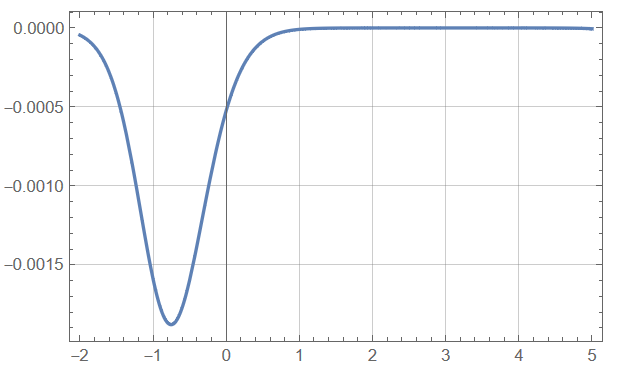I would like to numerically solve
$a^2\frac{d}{d\sigma}[(1+A_tQ)\frac{d\psi}{d\sigma}]=\psi(1+A_tQ-a\Phi\frac{dQ}{d\sigma})$
where $Q(\sigma)=\frac{2}{\sqrt{\pi}}\int_0^\sigma exp(-x^2)dx$.
$a$ and $A_t$ are certain parameters and $\psi(x)$is the desired function with certain boundary values and $\Phi$ is the eigenvalue of the equation. I started with the built-in shooting method:
a = 1/5;
A = 0.843;
Q[x_] := 2/Sqrt[Pi]*Integrate[Exp[-p^2], {p, 0, x}];
eq := a^2*D[(1 + A*Q[x])*D[psi[x], x], x] == psi[x]*(1 + A*Q[x] - a*Phi[x]*2/Sqrt[Pi]*Exp[-x^2]);
bc = {psi'[-2] == -1/a*Exp[-2/a], psi[-2] == -Exp[-2/a], psi[100] == 0};
s = NDSolve[{eq, bc, Phi'[x] == 0}, {psi[x], Phi[-2]}, {x, -2, 100},
Method -> {"Shooting",
"StartingInitialConditions" -> {Phi[-2] == 3}}];
However, this equation behaves badly, and with shooting method I always get NDSolve:berr, and the solution of Phi stays where the initial condition is set.
So I wrote a simple shooting method myself:
Q[x_] := 2/Sqrt[Pi]*Integrate[Exp[-p^2], {p, 0, x}];
eq := a^2*D[(1 + A*Q[x])*D[psi[x], x], x] == psi[x]*(1 + A*Q[x] - a*Phi*2/Sqrt[Pi]*Exp[-x^2]);
bc := {psi'[-2] == -1/a*Exp[-2/a], psi[-2] == -Exp[-2/a]};
a = 1/5;
A = 0.843;
Phi = 3;
d = 0.1;
Sol = NDSolve[{eq, bc}, psi, {x, -2, 100},
Method -> "ExplicitRungeKutta"];
m1 = Maximize[{Abs[psi[x] /. Sol[[1]]], 80 <= x <= 100}, x][[1]];
While[d > 0.0001,
Phi = Phi + d;
Sol = NDSolve[{eq, bc}, psi, {x, -2, 100},
Method -> "ExplicitRungeKutta"];
m1new = Maximize[{Abs[psi[x] /. Sol[[1]]], 80 <= x <= 100}, x][[1]];
If[m1new > m1, Phi = Phi - d; d = d/2, m1 = m1new];
Print[Phi];
]
This just works better and gave an approximate value, although the solution of $\psi(\sigma)$ is still diverging.
Since my scanning scheme is rough and doesn't guarantee a best solution in principle, is there any way to get the built-in shooting method to work? Or is there any better approach to this job?


Phi'[x]==0! $\endgroup$